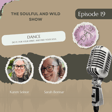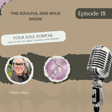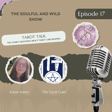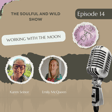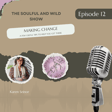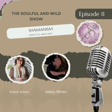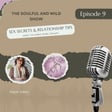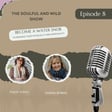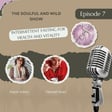Intro
Off Grid Living Festival and Natural Beekeeping
00:00:17
Karen Seinor
Hello and welcome to this episode of the Salsa Wild Show. I've just recently been to the Off Grid Living Festival Chilton. It was on just last weekend.
00:00:30
Karen Seinor
Really, really great storeholders, lots of interesting things. And had really interesting time listening Adrian Iodici, or I'm not quite sure how to pronounce his surname actually, but anyway. Adrian, who runs natural beekeeping in New South Wales.
00:00:51
Karen Seinor
Very interesting guy, really interesting approach to beekeeping.
Beekeeping as a Hobby and Its Beginnings
00:00:57
Karen Seinor
Very, not the mainstream is probably the way to And I don't know if you know this, but I have a couple of hives here. I've been keeping bees since I moved here to the cottage. It's my hobby.
00:01:10
Karen Seinor
because back when I was, working full time, Aubrey Hypnotherapy Clinic. I looked in the mirror one day and went, Karen C. Nour, you're the one that needs a hobby. You're working way too much. And now I'm definitely not working too much, doing way more fun things like keeping bees and going to festivals occasionally.
00:01:31
Karen Seinor
So... One of the things that happens with beekeeping is interesting practices that I have been a little bit challenged
Queen Replacement and Ethical Dilemmas
00:01:43
Karen Seinor
by. For example, you know, being a woman and aware of the importance of maintaining respect for older women particularly,
00:01:59
Karen Seinor
I've got a bit of a challenge about knocking off the queen every year or every second year as a matter of course and that's what a lot of beekeepers are taught to Now the reason that they do that is to keep the hive really active. They say that with a new queen that you can keep the bees calm and that's because
00:02:27
Karen Seinor
The queens are actually bred to be calm. And to keep that production of, you know, babies very high and that keeps the colony working at optimum level for greater honey production.
00:02:43
Karen Seinor
Now, most beekeepers do like honey and they do keep their beehives so that the household can have honey and maybe family and friends as well.
00:02:54
Karen Seinor
But there are many beekeepers, you know, hobby beekeepers, who have a hive for the good of the planet to, you know, keep everything trucking along nicely with plants, you know, to improve veggie garden and so on.
00:03:11
Karen Seinor
So it's a concept that I have been challenged by. did actually have to do that a couple of years ago because I got a really cranky hive. So I definitely needed to change that queen.
00:03:25
Karen Seinor
But I'm aware that it is a standard practice rather than something that is generally considered dependent on the hive. So had a really great time listening to Adrian.
00:03:37
Karen Seinor
And I asked him about...
Varroa Mite Threat in Australia
00:03:41
Karen Seinor
I'm not sure if all of you are aware that this little pest is everywhere in the world now.
00:03:50
Karen Seinor
Australia was the last place to get it. And evidently,
00:03:57
Karen Seinor
we've had it here for two years, I believe. But I heard on the weekend that it's actually been here longer and that it was only just published to or announced to the public two years ago that it had been here much longer.
00:04:14
Karen Seinor
Now one of the things that we are being encouraged as beekeepers to maintain the integrity of, to keep our beehives alive basically is to treat them when Virol might come. Now it's already in New South, it's in Canberra and it will be hitting, live in Albury so it's, you know, if we get through the whole of next season without Varroa, we will be very, very fortunate.
00:04:41
Karen Seinor
And I'm right on the border of New South and Vic, so it's on the move. And so we're being instructed to treat our hives with chemicals.
00:04:55
Karen Seinor
Some are natural-based, and it's quite a complex little process, timed. Some of the treatments you can't, eat the honey, all sorts of things are going to, it's going to become a little bit more complicated.
00:05:12
Karen Seinor
Now there is, I discovered, quite a movement of people in the US and who do not treat with chemicals their beehives.
00:05:26
Karen Seinor
And the reason that they don't do that is that bees have the capacity to shed their DNA. So What that means, as I understand it and I've got a very basic understanding, is that
00:05:44
Karen Seinor
if they have a trait that is not used or not needed, they will shed that trait. So what that means if we treat all of our bee colonies with chemicals against something like Varroa and then our colonies will shed any resilience that they might have to fight back against broal mite.
Impact of Beehive Loss on Food Production
00:06:08
Karen Seinor
Now, that's a complex thing, actually. So ethically, we want to be able to support the bees, to protect,
00:06:21
Karen Seinor
be resilient against a pest like that because it's brutal. What we've been told is to expect that we will lose 80% of beehives in Australia. Now, the outcomes of that, the flow on effect from that is going to be astronomical.
00:06:40
Karen Seinor
So think about it like this. I don't know that people have really got their head around what this actually could mean for us in terms of food production. And food security is a big deal for every single one of us.
00:06:54
Karen Seinor
So, you know, if you've got 10 beehives and you lose eight of them, that means that there's far less bees to pollinate veggies, fruit trees.
00:07:11
Karen Seinor
You know, the almond industry, for example, they truckloads and truckloads of beehives are transported in in the spring when the blossoms are out to pollinate those almonds so that they maintain their production, growing of the almonds. So there's only 20% of bees available to do that rather than 100%, that's going to mean a lot less almonds.
00:07:40
Karen Seinor
the price of almonds is going to go up. and just spread that across the whole country. And it starts to paint a picture about what's going to happen to the quantity of food and the cost of the food that is available.
00:07:57
Karen Seinor
mean, not tomorrow, but it's going happen. So that's a big concern. It's really got my mind thinking, you know, wow,
00:08:10
Karen Seinor
We've got this set of rules that's been set out. This is how we're going to treat it.
00:08:17
Karen Seinor
And we've got treat it with the chemicals. That's definitive. And I understand that. One of the things that's important is that, like for me, I've got to, my neighbour across the road has been, so anything do or don't do is going to impact his hives. Because if my colonies get where I'm, I'd,
00:08:37
Karen Seinor
His will end up with it. So
00:08:43
Karen Seinor
if I don't treat and I've got varroa mite, then his hives are going to be affected. Yeah, not
Community Cooperation Against Varroa Mite
00:08:48
Karen Seinor
good. So we kind of need to work together as a community of beekeepers to get things happening. And apparently the way varroa works is that even when there's some resilience, I mean,
00:09:04
Karen Seinor
The bees do fight back, obviously. And this for all might, for us, it would be like we had a dinner plate stuck to our back. And you can imagine if you, those little things with something, know, what comparatively would be a dinner plate for us on our back, that's going to weight them down. It's going to reduce their health, their ability to do their work.
00:09:32
Karen Seinor
When the colony gets weakened, then other pests come in, things like small hive beetle and wax moth.
00:09:43
Karen Seinor
So the colony might not get wiped out by the varal mite, but it gets weakened and then those other pests come in. Now, under normal circumstances, the bees themselves can deal with small hive beetle and wax moth most of the time.
00:09:59
Karen Seinor
So, you know, and for us beekeepers, it's our job to look after the hive sufficiently to make sure that the bees aren't taxed by too much space in, don't mind Toby, he's having a little stretch, he's going to lay himself down somewhere, just doing a bit of yoga.
Australia's Beekeeping Influence on the US
00:10:21
Karen Seinor
He's a sweet little dog. Yeah, so there's a real lot going on in this space and I'm very curious about what's going to happen and whether there's going to be grouping of people here in Australia who do things differently.
00:10:38
Karen Seinor
As I understand it, and I'm not really completely on top of this, I've just had some touches of information that have sparked off lot of thoughts.
00:10:53
Karen Seinor
My understanding is that In places like Europe, they've pretty much across the board just treated chemically their hives. So their bees have not had an opportunity. If there are any colonies that have resilience against the pest, they've been knocked out from having that because of that DNA shedding that bees do.
00:11:18
Karen Seinor
So I wonder whether Australia, and obviously how the government is, You know how organisations are. They just do what they do and don't think for themselves.
00:11:30
Karen Seinor
So I wonder how it would be if we did some really controversial sort of thinking and applied... different protocols rather than just doing what others have done, which hasn't been 100% successful. For example, there's a huge – it happening here in Australia is going to have a massive impact on the US because Australia has been exporting huge quantities of bees to the US to keep them afloat, and we're not going to be able to do that anymore for them.
00:12:05
Karen Seinor
So they're going to be on their own. in regard to bee production. So interesting times ahead, very interesting times ahead. So for those of you who are interested in food security and have an idea about the importance of that, then you'll understand why so many people are profoundly concerned about this issue.
00:12:31
Karen Seinor
And yet it's not something that is really out there and being discussed. I'm fascinated about this food security thing too because when I drive down the Hume Highway or the freeway, I've noticed all this fantastic grazing land.
00:12:50
Karen Seinor
And whether you're a vegetarian or a vegan or a carnivore, it's food production land,
Solar Panels and Soil Contamination Concerns
00:12:58
Karen Seinor
although mostly for beef cattle, that I've noticed.
00:13:03
Karen Seinor
it's now got solar panels on it. Now, one of the things that is of concern is the leaching into the soil that happens from these solar panels.
00:13:13
Karen Seinor
Is it from the lithium? I'm not 100% sure on that. So what that means is that that land can't be used to grow food for quite a period of time.
00:13:25
Karen Seinor
So we're actually being hit on a number of different faces here in terms of the security of our food sources.
00:13:40
Karen Seinor
Interesting times I feel, very interesting times. Now one of, I've got a fabulous book here, I'm just looking at my bookshelf to see if I can see it.
00:13:53
Karen Seinor
It is called, it's got a yellow spine and I don't actually see it there.
00:14:01
Karen Seinor
Anyway, Darn it. How annoying is that when you know you've got it and it just can't be seen? Anyway, this guy, he talks about the bees and timing of how long, once the bees are gone, how long we've got, basically.
00:14:25
Karen Seinor
Chilling thought. Very chilling thought. Fascinating book, actually. And he talks about He makes a reference of the colony. It's like the human brain.
00:14:38
Karen Seinor
There's nothing separate. We know, think we would all agree, that everything is connected, yeah? He talks about the structure, you know, the shape. of the wax little containers that the bees make. They build out the wax foundation and then they put honey into that and the queen also lays the eggs into that shape, a hexagon sort shape.
00:15:03
Karen Seinor
It is the strongest shape. It will withhold the most pressure. That's why those dome houses are so fantastic. And he also talks about...
00:15:15
Karen Seinor
Rudolf Steiner is the person who's written this. Actually, I think this book is taken from lectures that he gave to beekeepers in Europe. So it's an old book.
00:15:27
Karen Seinor
This all happened a long time ago. Very clever guy.
Rethinking Beekeeping Practices
00:15:31
Karen Seinor
You have heard of Steiner Education. It's quite innovative. He talks about that shape being the central shape this planet so even our bones the shape of our bones the cells within our bones have that shape fascinating stuff so yes a bit of a random rant about beekeeping and me sharing my thoughts from attending that talk but so many different things have come up from just listening to that short what 45 minute talk by Adrian
00:16:08
Karen Seinor
not only about beekeeping practices, but that tendency for us to just follow the rules, shall we say. And we do tend to do that. We just follow what is given because we all want to get along and do the right things.
00:16:28
Karen Seinor
And when they say this is the right thing, we tend to just go there and just accept that. But is that right? Now, I'm not saying that I will not be using chemicals to keep my beehives alive. I'm not saying that at all.
00:16:45
Karen Seinor
I'm just saying, is it the right thing? I know I'm going to do a little bit more research now and look beyond what I've been given. And I've been given, like all beekeepers in New South and probably Vic as well, lots of information and lots of support about how to deal with this when it comes.
00:17:04
Karen Seinor
But I'm interested now in looking further over the fence. What else is there? Are there other people who are doing things outside of the standard square? Sometimes we actually need to do that to get a different result because this has not really been resolved anywhere else.
00:17:26
Karen Seinor
We may still have a chance. don't know. maybe we still have a chance to resolve this. I mean, since I'm talking about bees, I love bees, and the golden liquid, beautiful honey.
00:17:41
Karen Seinor
mean, honey is such a healing thing. You know, a bee, one teaspoon of honey is the output from a bee's life.
00:17:53
Karen Seinor
I'm often astounded at people who smother it on and... chow it down like it's you know junk food I think about honey as nectar like like medicine and the interesting thing is that in the hive in the colony the queen is the central piece she is that the cog upon around which everything works and like to look at the
00:18:27
Karen Seinor
you know, the connectors, like in a household that really functions well and a family that works really well, it is the mother in the household, it's the woman that actually keeps that sorted.
Exploring Different Hive Types
00:18:38
Karen Seinor
If the woman's off the tree, the household doesn't work.
00:18:42
Karen Seinor
When a woman is really balanced and calm and taking care of herself, she's able to care for the others and keep everybody on track. It's really interesting, isn't it? Yeah. Yeah, I'm digressing a little bit here. I just sort wanted to talk about this issue about the bees and what is happening and the potential issues for us with food security, whether or not our practices, which are fundamentally, you know, commercially based, you know,
00:19:15
Karen Seinor
Like I've just got a couple of beehives here. It's very hands-on. It's very much I work with the weather. I don't go out to the hives if I'm off kilter. I need to be calm and relaxed and balanced, move slowly, have time.
00:19:33
Karen Seinor
It's not something that you can rush if you're working with your bees. Because when I'm calm, they're calm. And it's easy to work with them. So in a commercial situation, it's quite different.
00:19:48
Karen Seinor
I've actually got three hives here. I've got a Kenyan top bar hive, I have a flow hive, and I've got the more traditional square commercially based Langstroth hive.
00:19:59
Karen Seinor
And working on those three hives is very, very different because of the physical setup. Which of those is best for the bees? Actually, you think that the Kenyan is the best.
00:20:11
Karen Seinor
To be honest, for me, it's actually the easiest to work with because I'm standing up. It's at waist height. The bees create their own foundation to the size that they want.
00:20:23
Karen Seinor
Unlike in a Langstroth where you provide foundation and, you know, provide a square frame, they have to build it within that space.
00:20:34
Karen Seinor
In the Kenyan top bar hive, they actually make their own comb, their own honeycomb, and so they do the size that's right for them. So they make different sizes. So, for example, there is a bee called a drone, and they're bigger.
00:20:51
Karen Seinor
So in a Langstroth hive, where the foundation is provided, then those drones are smaller. They're forced to be smaller.
00:21:02
Karen Seinor
Whereas in a more natural sort of environment, like out in the bush, the bees just make the comb to the size that is appropriate for them. Yeah, very interesting, interesting stuff.
00:21:15
Karen Seinor
I think that we do not appreciate honey for what it is. It's an incredible healing liquid. In essence, when I go and take honey from my hives,
00:21:26
Karen Seinor
I'm stealing their food. So I really consider that when I'm looking at what's available. You know, is there going to be enough to take them through the winter?
00:21:38
Karen Seinor
And of course, that's a big question for us at the moment. This particular year, there's a lot of people already are feeding their hives because it just hasn't been a great season food-wise. So the bees are under the pump here.
00:21:52
Karen Seinor
they're hungry already. You know, there's not a lot of food around for them. And, yeah, so that means that the queen lays less eggs.
Bees and Human Food Security
00:22:02
Karen Seinor
So we're kind of setting up for this unpleasant little storm for next season. Yeah, watch this space.
00:22:10
Karen Seinor
Keep your ears peeled for what's going on in bee world because bee world matters to our human world for sure. Yeah. So all praise to the bee goddess. We've got to look after her. We've got to do what we can to keep those bees in a good place.
00:22:26
Karen Seinor
And, yeah, I'm going to be looking into this a little more and I invite you to keep your ear out and hear what's going on You know, as always, do we have all the information? I never really know that.
00:22:41
Karen Seinor
We certainly get told what the corporations and the governments want us to know, but do we know it all? I don't know. But, yes, sacred honey, sacred bees, they're under threat.
00:22:59
Karen Seinor
So something to know, something to think about you, Maybe this is a time that you might want to get into beekeeping to help be part of the saving of the bees.
00:23:15
Karen Seinor
I don't know. But the other thing, before I just finish off the other thing, what does this mean when an organism that is so female-centric, like a bee colony, is under threat in such a tangible, physical way?
Symbolic Connection Between Bees and Environmental Issues
00:23:35
Karen Seinor
Is that not a reflection the feminine, as in the big feminine, the big mama, as in the planet? think there's always correlations between these things because, you know, everything is connected.
00:23:53
Karen Seinor
Challenging times, right? So this is not a big boo-boo thing. I just thought I'd share these thoughts about what's going on with the bees and prompt that, know, Or invite that thought for you to think about what does it mean for you and for us as a collective with the bees under threat in this country and across the world. I mean, we've been sitting here pretty on our little island or our big continent, safe and protected, but no longer. we're now in there with everybody else and bees are under threat.
00:24:34
Karen Seinor
Interesting times ahead. Take care.
Outro


